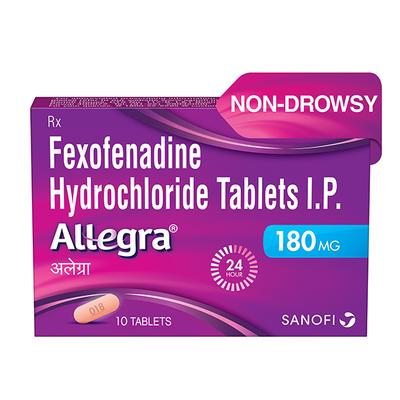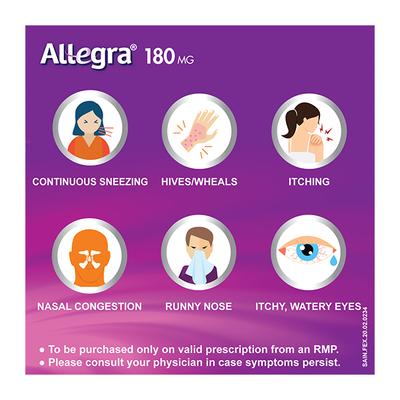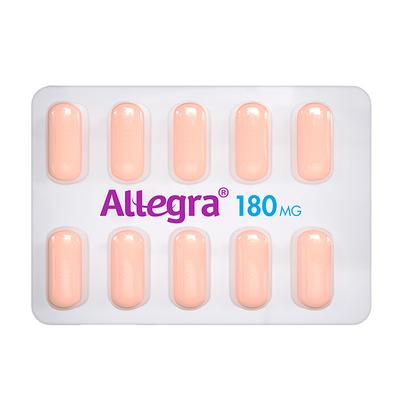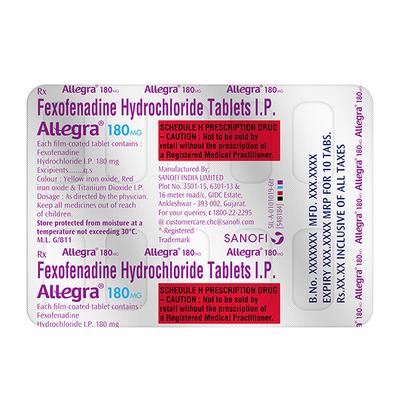

Netmeds First Membership
Quick Links
Introduction About ALLEGRA 180MG TABLET
ALLEGRA 180MG TABLET contains Fexofenadine which belongs to the group of medicines called Antihistamines. It is used in adults and children (aged above 12 years) to provide relief from symptoms of hay fever or seasonal allergic rhinitis. It is also used to provide relief from symptoms associated with chronic idiopathic urticaria in adults and children (aged above 12 years), generally characterized by symptoms such as itching, swelling and rashes.
Seasonal allergic rhinitis is an inflammatory condition of the upper airways that occurs in response to exposure to airborne allergens (such as tree, grass and weed pollens) in sensitized individuals which is generally characterized by symptoms such as nasal stuffiness, itchy nose/throat/eyes, headache and weakness. Avoid drinking fruit juices such as grapefruit, orange and apple while taking ALLEGRA 180MG TABLET as it may reduce the effect of this medicine. ALLEGRA 180MG TABLET is not recommended for use in patients allergic to Fexofenadine.
Before taking ALLEGRA 180MG TABLET, inform your doctor if you or your child has intolerance to certain sugars (such as lactose), liver, kidney and/or heart problem. ALLEGRA 180MG TABLET is not recommended for use in pregnant women unless advised by the doctor and it is not indicated for use in breastfeeding women. The medicine is recommended for use in children and adolescents (aged above 12 years). Consult your child’s doctor before administering this medicine to your child. It is used with caution in elderly patients above 65 years of age. The most common side effects of taking ALLEGRA 180MG TABLET are headache, drowsiness, dizziness and nausea. Consult your doctor if any of the side effects worsen.
Uses Of ALLEGRA 180MG TABLET
Used in adults and children (aged above 12 years) to provide:
- Relief from the symptoms of hay fever (seasonal allergic rhinitis)
- Relief from the symptoms of chronic idiopathic urticaria
How ALLEGRA 180MG TABLET Works
ALLEGRA 180MG TABLET works by blocking the actions of H1 histamine receptors (chemical substance responsible for allergic reaction) that results in managing the occurrence of seasonal allergic rhinitis and idiopathic urticaria thus providing relief from the symptoms associated with both conditions.
How to use ALLEGRA 180MG TABLET
Take ALLEGRA 180MG TABLET as advised by your physician. Swallow this medicine and do not crush or chew the medicine. Correct dose and duration will be decided by your doctor depending upon your age, body weight and disease condition.
Side Effects Of ALLEGRA 180MG TABLET
Common
- Headache
- Drowsiness
- Dizziness
- Nausea
Uncommon
- Tiredness
- Sleepiness
Stop taking ALLEGRA 180MG TABLET and contact your doctor immediately if you experience any of the following side effects:
- Signs of serious allergic reaction such as swelling of the face, lips, tongue or throat and difficulty breathing
How To Manage Side Effects
Dizziness Or Drowsiness
Try to rest and get enough sleep. Try to avoid driving or operating any tools or machines while you feel dizzy. Limit consumption of alcohol, as it can aggravate dizziness. Consult and inform your doctor if the symptom worsens.
Headache
Apply hot or cold-water bag on your child’s head. Try to take rest in a quiet and dark room. Drink tea or coffee. Massage on scalp or head with mild pressure. In case of no improvement in the symptom, consult your doctor.
Nausea And Vomiting
Try to take ALLEGRA 180MG TABLET with or just after a meal or a snack. Stick to simple meals. Avoid eating oil rich, fried or spicy food. Consult your doctor if the symptom gets worse.
Tiredness
Make sure you take rest and drink plenty of fluids. Avoid or limit the consumption of alcohol. Try to take ALLEGRA 180MG TABLET at a time when you can sit down (or lie down) when the symptoms are at their worst. Avoid driving or using tools or machinery until you feel well.
Warning & Precautions
Pregnancy
Monitoring requiredALLEGRA 180MG TABLET is generally not recommended for use in pregnant women unless considered clearly necessary. Consult your doctor before taking it.
Breastfeeding
ContraindicatedALLEGRA 180MG TABLET is not recommended for use in breastfeeding women. Consult your doctor for advice.
Driving and Using Machines
Use with CautionDo not drive or operate machines if ALLEGRA 180MG TABLET makes you dizzy or sleepy. Consult your doctor before taking ALLEGRA 180MG TABLET.
Kidney
Use with CautionALLEGRA 180MG TABLET should be used with caution in patients with kidney problems. Consult your doctor before taking it.
Liver
Use with CautionALLEGRA 180MG TABLET should be used with caution in patients with liver problems. Consult your doctor before taking it.
Allergy
ContraindicatedDo not take ALLEGRA 180MG TABLET if you are allergic to Fexofenadine or any other ingredients of this medicine.
Heart Disease
Use with CautionALLEGRA 180MG TABLET should be used with caution in patients with heart disease. Consult your doctor before taking it.
Use In Pediatrics
SafeALLEGRA 180MG TABLET is recommended for use in children and adolescents (aged 12 to 18 years). Consult your child’s doctor for advice before administering this medicine to your child.
Use In Geriatrics
Use with CautionALLEGRA 180MG TABLET is used with caution in elderly patients above 65 years of age. Before taking ALLEGRA 180MG TABLET, consult your doctor.
Others
Before taking ALLEGRA 180MG TABLET, inform your doctor if you:
- Are intolerant to certain sugars such as lactose
Interactions
A. Drug-Drug interactions:
Before taking ALLEGRA 180MG TABLET, inform your doctor if you are taking any of the following medicines:
- Aluminum and magnesium (medicines used to relieve symptoms of heart burn or indigestion)
B. Drug-Food interaction:
Avoid drinking fruit juices such as grapefruit, orange and apple while taking ALLEGRA 180MG TABLET as it may reduce the effect of the medicine. Consult your doctor before taking it.
Overdosage:
If you or anyone else accidentally take too much of ALLEGRA 180MG TABLET, consult your doctor immediately or visit the nearby hospital. Signs of overdose are dizziness, drowsiness, weakness and dry mouth.
Synopsis
| Drug | : | Fexofenadine |
| Pharmacological Category | : | Antihistamines |
| Therapeutic Indication | : | Seasonal allergic rhinitis, Chronic idiopathic urticaria |
| Dosage Forms | : | Tablet, Oral suspension, Syrup |
More Information
Storage
- Keep ALLEGRA 180MG TABLET out of reach of children
- Store at room temperature
FAQs About ALLEGRA 180MG TABLET
Q: What is ALLEGRA 180MG TABLET and why is it given?
A: ALLEGRA 180MG TABLET contains Fexofenadine which is an Antihistamine, used in adults and children (aged above 12 years) to provide relief from symptoms of hay fever or seasonal allergic rhinitis. It is also used to provide relief from symptoms associated with chronic idiopathic urticaria in adults and children (aged above 12 years), generally characterized by symptoms such as itching, swelling and rashes.
Q: Is ALLEGRA 180MG TABLET safe to be used in pregnant and breast-feeding women?
A: ALLEGRA 180MG TABLET is not recommended for use in pregnant women unless clearly necessary which is also not recommended for use in breast feeding women. Consult your doctor before taking this medicine.
Q: What side effects are seen with ALLEGRA 180MG TABLET?
A: Like all medicines, ALLEGRA 180MG TABLET can cause side effects, although not everybody gets them. The most common side effects of taking ALLEGRA 180MG TABLET are headache, drowsiness, dizziness and nausea. Contact and inform your doctor if the symptoms worsen.
Q: How ALLEGRA 180MG TABLET should be taken?
A: Take ALLEGRA 180MG TABLET as advised by your physician. Swallow this medicine and do not crush or chew the medicine. Correct dose and duration will be decided by your doctor depending upon your age, body weight and disease condition.
Q: Does ALLEGRA 180MG TABLET causes dizziness?
A: Yes, ALLEGRA 180MG TABLET causes dizziness as it is the commonest side effect associated with the use of this medicine. If such side effects are experienced, then lie or sit down immediately when you feel dizzy. If you're feeling a severe episode of vertigo, lie in a dark and quite place with eyes closed. Talk to your doctor if the symptom does not improve.
References
1. KD. Tripathi. Histamine and Antihistaminics. Essentials of medical pharmacology. Seventh edition. 2013. Page-166.
2. Kari L. Craun; Mark P. Schury. Fexofenadine. NIH National Library of Medicine. National center for biotechnology information. May 2022. [Accessed on 9th June 2022] https://www.ncbi.nlm.nih.gov/books/NBK556104/
3. Meji Pharma Spain S.A. Health Product Regulatory Authority (HPRA). [Revised in February 2021]. [Accessed on 9th June 2022] https://www.hpra.ie/img/uploaded/swedocuments/d5c3161e-75cd-47f8-b87d-0ffc7514e638.pdf
4. Sanofi-aventis U.S. LLC. U.S. Food & Drug Administration (FDA). [Revised in 2007] [Accessed 9th June 2022] https://www.accessdata.fda.gov/drugsatfda_docs/label/2008/020872s018,021963s002lbl.pdf
5. Dr. Reddy’s Laboratories (UK) Ltd. Electronic Medicines Compendium (EMC). [Revised in August 2018]. [Accessed 9th June 2022] https://www.medicines.org.uk/emc/files/pil.3488.pdf
Useful Diagnostic Tests
- Allergen-specific immunoglobulin E (IgE) antibody test











